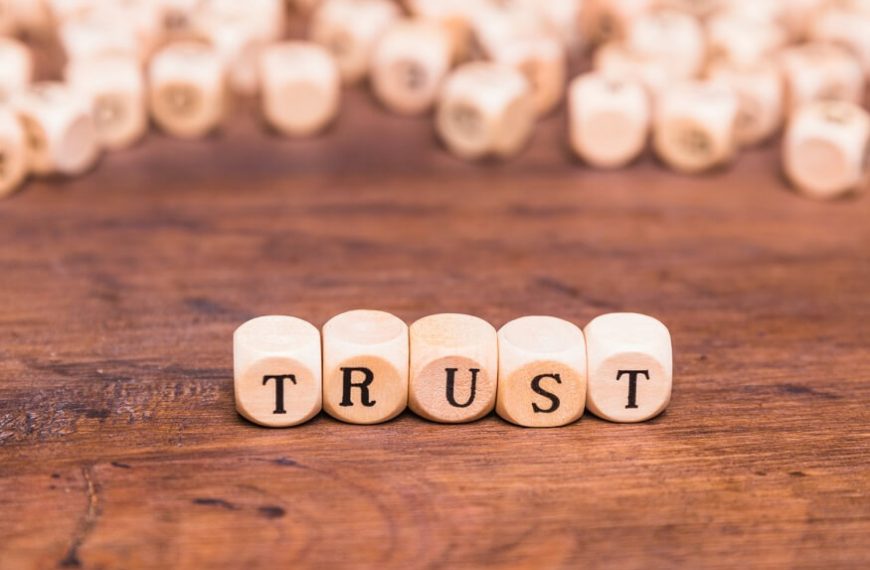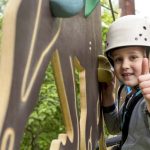In the complex journey of childhood, trust forms the sturdy foundation upon which lasting relationships are built. Engaging children in activities that foster trust not only strengthens interpersonal connections but also lays the groundwork for emotional intelligence and resilience. In this comprehensive guide, we’ll dive deeper into the significance of trust-building activities, exploring 10 fascinating trust-building exercises designed with great care to cultivate the trust factor in children. These activities go beyond the surface, promoting an environment where mutual respect and understanding flourish.
- Blindfolded Team Building:
- Trust Walks:
- The Human Knot:
- Mirror, Mirror:
- Trust Falls:
- Emotion Charades:
- Building a Trust Web:
- Storytelling Circles:
- Collaborative Artwork:
- Compliment Circle:
Encourage teamwork and communication by having children navigate obstacle courses blindfolded. This trust-building exercise increases their dependency on verbal cues and strengthens the bond within the team. As they guide and rely on each other, children develop a profound sense of trust in their peers, laying the groundwork for effective collaboration in various aspects of life.
Pair children up and have one partner blindfolded while the other leads them through a designated path. This activity enhances communication skills and reinforces the importance of trust in relationships. By relying on verbal guidance and physical support, children learn to trust not only their own abilities but also the guidance and support of their partners, fostering a sense of security and interconnectedness.
In this classic trust-building exercise, children stand in a circle, and each person grabs the hands of two others. The challenge is to unravel the human knot without letting go of each other’s hands, fostering collaboration and trust. As they work together to solve the puzzle, children learn the importance of clear communication, patience, and trust, essential skills that extend beyond the boundaries of the activity.
Pair children and designate one as the “mirror” and the other as the “reflection.” The mirror mimics the movements of the reflection, building trust through non-verbal communication and synchronization. This activity not only enhances trust but also promotes empathy as children learn to understand and anticipate each other’s movements, creating a sense of connection that goes beyond words.
Though a well-known activity, trust falls remain effective. Children take turns falling backward, relying on their peers to catch them. This simple yet impactful exercise instills confidence in both the faller and the catcher. The act of surrendering to gravity and trusting that their peers will provide a secure landing fosters a sense of reliance and mutual support, laying the groundwork for trusting relationships.
Encourage emotional expression by playing a game of focusing on various emotions. Children take turns acting out emotions while their peers guess, fostering trust through vulnerability and shared understanding. This activity goes beyond the physical domain, diving into the emotional landscape of trust. By expressing and recognizing emotions, children develop a deeper understanding of themselves and others, strengthening the bonds of trust.
Create a symbolic web using string, with each child holding a section. As they share positive experiences or express gratitude, the web grows stronger, visually representing the interconnectedness that trust brings. This activity introduces the concept of a collective trust ecosystem, emphasizing that each individual’s actions contribute to the overall strength of the group. It encourages children to reflect on the positive aspects of their relationships, reinforcing trust through shared experiences.
Gather children in a circle and take turns sharing personal stories. This activity creates a safe space for openness and vulnerability, reinforcing the trust factor within the group. Through storytelling, children not only share their experiences but also develop active listening skills. The act of sharing personal stories fosters a sense of authenticity and connection, building trust as children recognize the value of their individual narratives within the collective story of the group.
Engage children in a collective art project where each child contributes to a larger piece. This activity promotes cooperation, as every child trusts that their contribution adds value to the final masterpiece. The collaborative aspect of this activity emphasizes the importance of each individual’s unique strengths and perspectives. Trust is built not only in the creative process but also in the recognition of each child’s creative contributions, fostering a sense of inclusion and appreciation.
End the trust-building activities with a compliment circle. Each child takes a turn standing in the center while peers offer sincere compliments. This positive reinforcement enhances self-esteem and reinforces trust within the group. The Compliment Circle serves as a powerful tool to celebrate individual strengths and achievements, creating a culture of positivity and mutual support. As children express genuine appreciation for each other, trust becomes a shared value that strengthens the fabric of their relationships.
The Educational Value of Trust-Building Activities for Kids: Learning Through Connection
Beyond their immediate impact on interpersonal relationships, activities for kids to build trust offer an abundance of educational benefits:
- Social Skills Development:
- Emotional Intelligence:
- Conflict Resolution:
- Self-Confidence:
Trust-building activities require communication, collaboration, and teamwork, fostering the development of essential social skills that contribute to a child’s overall well-being.
Engaging in activities that explore emotions enhances a child’s emotional intelligence. As they recognize and express their feelings, children develop a deeper understanding of themselves and others.
Trust-building activities often involve overcoming challenges and conflicts. Through these experiences, children learn effective problem-solving and conflict-resolution skills, crucial for kids’ development.
Trust-building exercises, such as trust falls and collaborative projects, contribute to the development of self-confidence. Children learn to trust their abilities and recognize the value of their contributions.
In the playground of life, trust becomes the swing that drives children to new heights. Through these 10 engaging activities, we provide a roadmap for parents, educators, and caregivers to foster the trust factor in children. Along with making lasting memories, these activities impart important life lessons that help people grow into resilient, self-assured, and sympathetic people. By participating in activities for kids to build trust, we plant the seeds for a time when mutual understanding underpins relationships and trust is a living, breathing concept that forges bonds and fortifies the bonds within our communities. So, let the journey of trust-building begin, one fascinating activity at a time!
In expanding upon these trust-building activities, we emphasize their multiple benefits, diving into the educational value and broader impact on a child’s social and emotional development. The additional insights provided serve as a guide for parents, educators, and caregivers, empowering them to create meaningful and transformative experiences for the children they nurture and guide.
At EuroKids, we understand the profound impact of trust on a child’s holistic development. Our commitment to nurturing not just academic skills but also essential life skills is reflected in our innovative approach to education. Through engaging activities and programs, such as the trust-building exercises outlined here, EuroKids aims to create a learning environment where trust is a fundamental building block.
Our experienced educators recognize the transformative power of trust in shaping a child’s character and relationships. In our specially designed trust-building activities, children embark on a journey of self-discovery and connection, guided by the principles of cooperation, communication, and collaboration. Early trust-building is crucial for every child’s overall success and well-being, according to EuroKids.
















